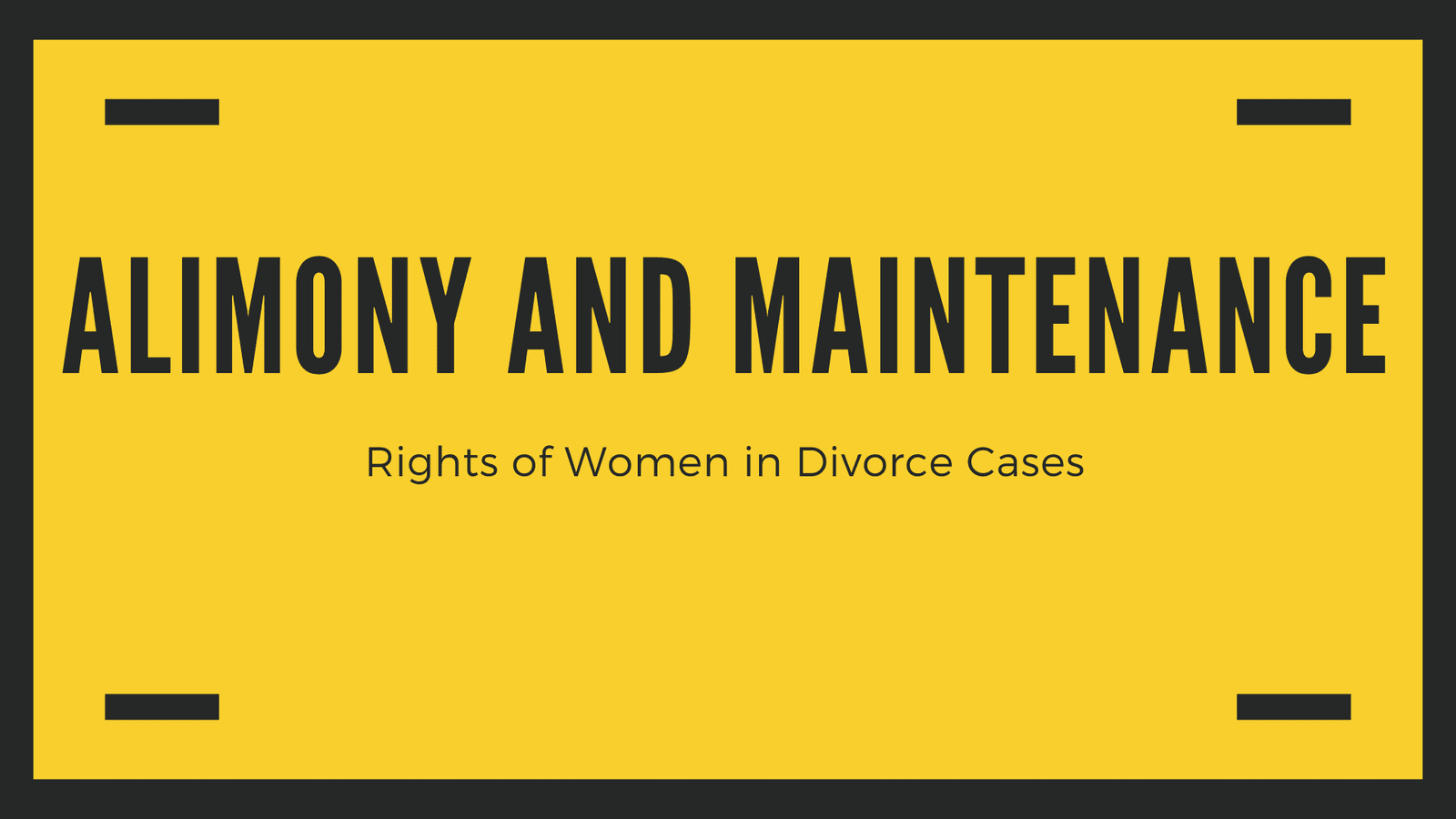
Divorce can be a challenging and emotionally charged process, especially when it comes to financial matters. In India, alimony and maintenance are crucial aspects of divorce proceedings, ensuring that both parties, particularly women, receive fair financial support post-divorce. The introduction of the new Bharat Nirman Shastri (BNS) laws has brought changes to the legal landscape, making it essential for women to understand their rights and entitlements regarding alimony and maintenance. This blog will provide a comprehensive guide on alimony and maintenance, focusing on women’s rights, the legal framework, and the implications of the new BNS laws.
Table of Contents
What is Alimony and Maintenance?
1. Definition
- Alimony: Alimony is a financial support provided by one spouse to the other following a divorce or separation. It aims to ensure that the lower-earning or non-earning spouse is not left in financial hardship due to the divorce.
- Maintenance: Maintenance is a broader term that includes financial support provided during the marriage or after separation, including while divorce proceedings are ongoing.
2. Legal Framework
Under the new Bharat Nirman Shastri (BNS) laws, the provisions for alimony and maintenance have been updated to provide clearer guidelines and protections. These laws impact various personal laws in India:
- Hindu Marriage Act, 1955
- Special Marriage Act, 1954
- Dissolution of Muslim Marriages Act, 1939
- Parsis Marriage and Divorce Act, 1865
Rights of Women to Alimony and Maintenance
1. Hindu Marriage Act, 1955
Under the Hindu Marriage Act, 1955, women have specific rights to alimony and maintenance:
- Interim Maintenance: During divorce proceedings, the court can grant interim maintenance to ensure that the wife’s basic needs are met. This is meant to support the wife until a final decision is made regarding permanent alimony.
- Permanent Alimony: Once the divorce is finalized, the court may award permanent alimony based on factors such as the wife’s financial status, the husband’s income, and the standard of living during the marriage.
- Factors Considered: The court considers various factors when determining alimony, including the duration of the marriage, the wife’s financial needs, and the husband’s ability to pay.
2. Special Marriage Act, 1954
The Special Marriage Act, 1954 provides similar provisions for alimony and maintenance:
- Maintenance During Proceedings: The court can grant maintenance to the wife during divorce proceedings to ensure her financial stability.
- Alimony Post-Divorce: Permanent alimony can be awarded after divorce, considering the wife’s financial needs and the husband’s financial capacity.
- Criteria: The court assesses the financial position of both parties, the length of the marriage, and any other relevant factors.
3. Dissolution of Muslim Marriages Act, 1939
For Muslim women, the Dissolution of Muslim Marriages Act, 1939 provides:
- Mahr (Dower): The wife is entitled to receive mahr (a pre-agreed amount) upon divorce, which is a part of her financial rights.
- Maintenance: The court may also grant maintenance for a reasonable period after divorce, especially if the wife has not remarried.
- Financial Needs: Maintenance is determined based on the wife’s financial needs and the husband’s ability to provide support.
4. Parsis Marriage and Divorce Act, 1865
Under the Parsis Marriage and Divorce Act, 1865:
- Alimony: The court can grant alimony to the wife based on her financial needs and the husband’s ability to pay.
- Maintenance: Similar to other personal laws, maintenance can be awarded during and after divorce proceedings to ensure the wife’s financial stability.
Determining Alimony and Maintenance
1. Financial Assessment
- Income and Assets: The court assesses the income, assets, and financial status of both parties to determine the amount of alimony and maintenance.
- Standard of Living: The aim is to maintain a standard of living similar to what the wife enjoyed during the marriage.
2. Duration of Marriage
- Long-Term Marriages: In long-term marriages, the court may award higher alimony due to the longer period of financial dependence.
- Short-Term Marriages: For shorter marriages, the alimony amount may be adjusted accordingly.
3. Contribution to Marriage
- Household Contribution: The court may consider the wife’s contributions to the household and family life when determining alimony.
- Career Sacrifice: If the wife sacrificed career opportunities for the marriage, this may also impact the alimony decision.
Procedure for Claiming Alimony and Maintenance
1. Filing a Petition
- Petition Submission: To claim alimony and maintenance, the wife must file a petition in the family court. The petition should include details of financial needs and evidence of the husband’s income and assets.
- Legal Representation: It is advisable to seek legal representation to navigate the legal process and ensure that the petition is properly drafted and filed.
2. Court Proceedings
- Interim Hearing: The court may hold interim hearings to address immediate financial needs during divorce proceedings.
- Final Hearing: In the final hearing, the court will review evidence, witness testimonies, and other relevant information to determine the amount of alimony and maintenance.
3. Enforcement of Orders
- Court Orders: Once the court issues an order for alimony or maintenance, it is legally binding. The husband is required to comply with the court’s decision.
- Legal Recourse: If the husband fails to comply with the court order, the wife can seek legal recourse to enforce the payment, including filing for contempt of court.
Challenges and Considerations
1. Enforcement Issues
- Non-Payment: Some women may face challenges in enforcing alimony and maintenance orders, especially if the husband fails to make payments.
- Legal Assistance: Seeking legal assistance to address non-payment and enforcement issues can help ensure that financial support is received.
2. Financial Disclosure
- Transparency: The court relies on accurate financial disclosures from both parties. If there is a lack of transparency regarding income and assets, it can impact the determination of alimony.
- Legal Advice: Consulting with a lawyer can help ensure that all financial disclosures are complete and accurate.
3. Emotional Impact
- Emotional Well-being: The process of claiming alimony and maintenance can be emotionally taxing. Support from family, friends, and counseling services can be beneficial.

Resources and Support
1. Legal Aid Services
- National Legal Services Authority (NALSA): Provides legal aid and support for women seeking alimony and maintenance. NALSA Website
2. Family Counseling
- Professional Counseling: Counseling services can offer support during the divorce process and help manage the emotional aspects of financial disputes.
3. Legal Information
- Kanoon360: Offers resources and information on alimony and maintenance, including legal procedures and rights. Kanoon360 Website
4. Educational Platforms
- Online Resources: Educational platforms provide articles, guides, and videos on alimony and maintenance, helping individuals understand their rights and the legal process.
Conclusion
Alimony and maintenance play a critical role in ensuring financial stability for women following divorce. With the new Bharat Nirman Shastri (BNS) laws, understanding the rights and procedures related to alimony and maintenance has become essential. Women have legal entitlements to financial support, and the courts are equipped to provide fair and just settlements based on various factors.
By understanding the grounds for alimony and maintenance, the procedure for claiming these rights, and the available resources and support, women can navigate the divorce process more effectively and secure the financial support they are entitled to.
References:
- Bharat Nirman Shastri (BNS) Laws. Government of India Official Gazette
- Hindu Marriage Act, 1955. Link to Act
- Special Marriage Act, 1954. Link to Act
- Dissolution of Muslim Marriages Act, 1939. Link to Act
- Parsis Marriage and Divorce Act, 1865. Link to Act
- National Legal Services Authority. NALSA Website
- Kanoon360. Legal Resources
Understanding the rights to alimony and maintenance is crucial for women going through divorce. By leveraging the legal framework and available resources, women can ensure they receive fair financial support and navigate the divorce process with greater confidence.



